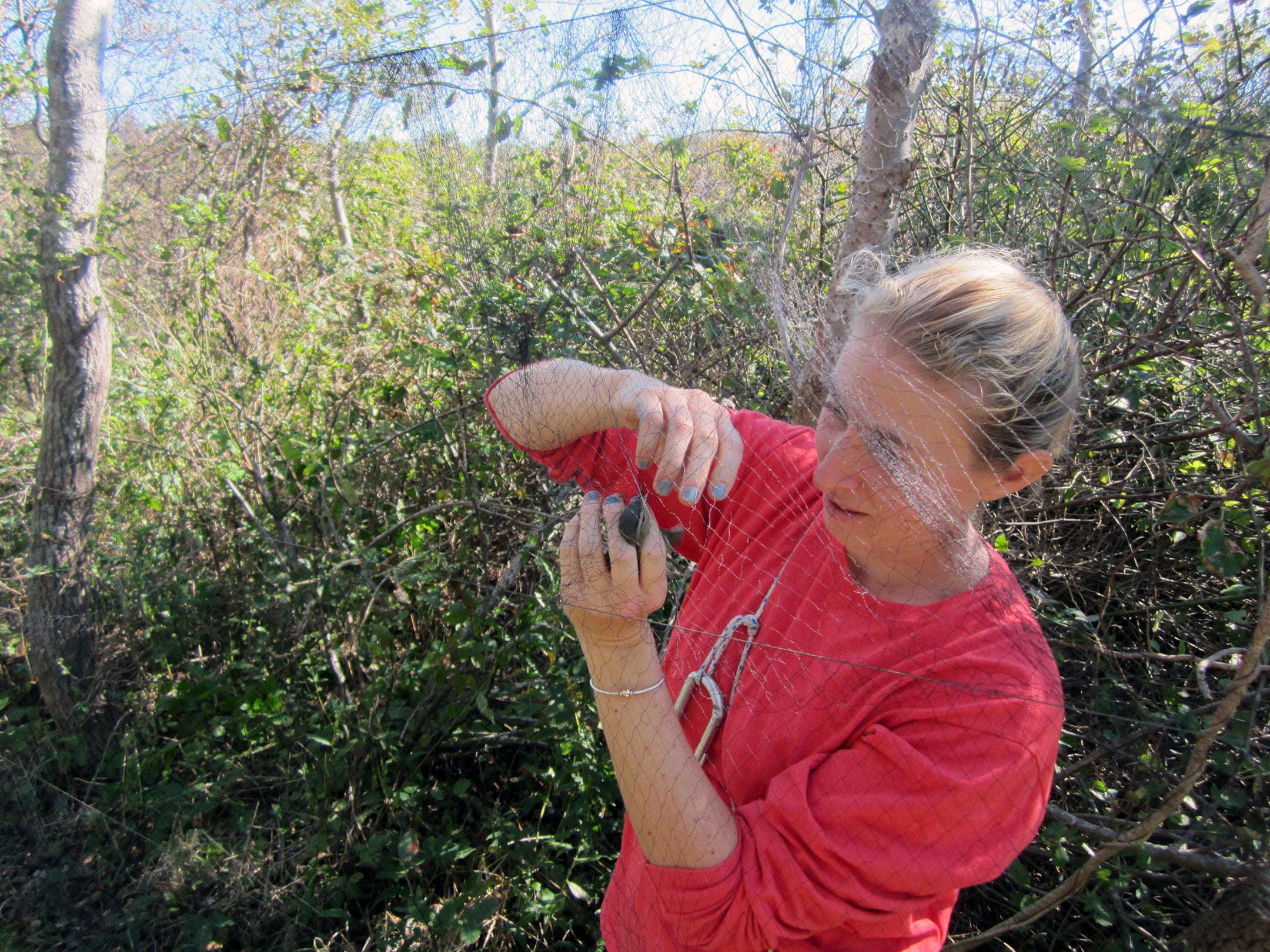KINGSTON, R.I. – November 9, 2016 – University of Rhode Island doctoral student Clara Cooper-Mullin spent this year’s entire fall bird migration season in a tiny cramped structure on Block Island that doubled as her living quarters and bird banding station. But her work there is revealing new insights into why birds behave the way they do during migration.
“I’m looking at whether their body condition is a factor in the way the birds behave at migration stop-over points like Block Island,” explained Cooper-Mullin, who grew up in Irvington, N.Y. “Birds are mostly consuming fruit during migration, so I’m trying to figure out what they’re getting out of the fruit and how it influences their behavior as they leave.”
Her study follows up on one conducted at the same site by a previous URI graduate student, Adam Smith, who found that hermit thrushes in good physical condition moved around less when they stop at Block Island, presumably because they didn’t have to feed much, and they were more likely to go straight south when they departed the island. Hungry birds typically spent more time on the island feeding and continued their migration by following the coastline.
Working in collaboration with URI Professor Scott McWilliams, Cooper-Mullin focused her field work this year on blackpoll warblers, which migrate from the boreal forests of Canada to the Caribbean by undertaking a three-day flight over the ocean from southern New England.
Every day, she and research technician Olivia DaRugna captured migrating blackpolls and placed them in temporary cages where they were fed a special diet for several days before being released. Some were fed as much food as they could eat, while others were fed just enough to keep them in the same thin condition they arrived in. The researchers then monitored the behavior of the released individuals as the birds prepared to continue their migration.
“Blackpolls fatten up really fast,” said Cooper-Mullin. “The reason they’re trying so hard to fatten up is because they’re about to leave here and go straight over the water for several days. They need that body condition to get ready to fly.”
By contrast, red-eyed vireos – another species she is studying for comparison – take their time eating. They typically spend most of their migration flying over land.
“They don’t seem so eager to get super fat,” Cooper-Mullin said. “They still fatten up, but they just don’t seem as desperate to put on fat. My overall sense is that body condition is much more important to blackpolls as they prepare to migrate.”
Last year, Cooper-Mullin studied the diet and migration habits of yellow-rumped warblers, a common migrant that is one of the only birds that feed on the berries of wax myrtle, an abundant shrub on Block Island.
“Since no one else eats wax myrtle, they have this whole food source to themselves and they don’t have to try very hard to get it,” Cooper-Mullin said. “So their body condition doesn’t seem to be as important as other factors like the weather in determining when to migrate. Southern New England is also near the end of their migration, so they don’t have much farther to go.”
In addition to manipulating their diet, Cooper-Mullin is evaluating the role of antioxidants in the birds’ diet by analyzing blood samples from bird species that have different migration strategies.
When birds fly long distances, their metabolism rate skyrockets, which produces harmful byproducts called reactive species that can cause molecular damage. The antioxidants the birds ingest from the berries they eat helps to neutralize the reactive species.
“Once the birds have damaged molecules, they don’t function properly and all sorts of things can go wrong,” said Cooper-Mullin.
The URI student, who earned biology degrees from Kenyon College and Ohio State University, became hooked on birds because of her fascination with their flight skills.
“I really love their physiology,” she said. “It’s interesting to look inside a body and figure out what makes an organism move or talk or be able to live. And I love that birds are everywhere and there are so many different kinds.
“You could study them forever and never know everything about them.”

